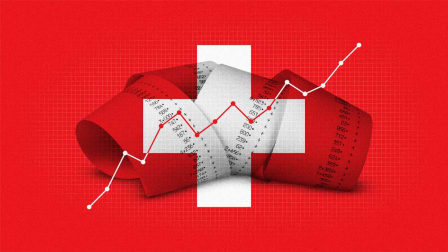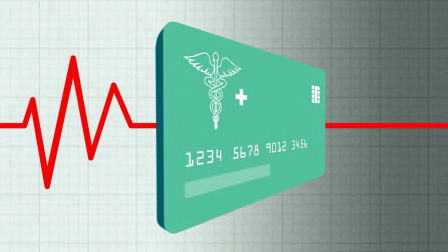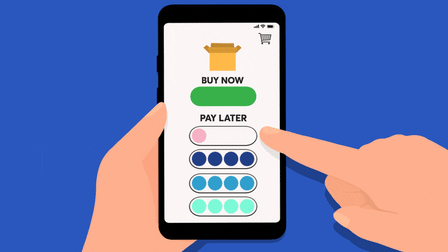Debt Collectors Will Be Able to Contact You on Facebook, Instagram, and Twitter
A new CFPB rule will give collection agencies more ways to find you. Here's what to do if they come after you.

A new rule finalized today by the Consumer Financial Protection Bureau (CFPB) will let debt collectors contact consumers not just by phone, as presently permitted, but also by email, text message, and even using platforms like Facebook, Instagram, and Twitter.
Once the new rule takes effect a year from today, collection agencies will also be allowed to contact consumers more frequently. They’ll be able to place up to seven debt-collection phone calls per week (and under some circumstances even more), as well as send an unlimited number of text and email messages and social media private posts.
The CFPB noted in its announcement today that consumers can opt out of all electronic communications with debt collectors. How exactly they'll be able to do that, though, hasn't been worked out yet.
“The rule clarifies how debt collectors can use email, text messages, social media, and other contemporary methods to communicate with consumers,” the bureau's director, Kathleen L. Kraninger, wrote in a post also released today. “And our rule will allow consumers, if they prefer, to limit the ability of debt collectors to communicate with them through these newer communication methods.”
A spokesperson for Facebook, which owns Instagram, says, "We are in the process of reviewing this new rule and will work with the Consumer Financial Protection Bureau over the coming months to understand its effect on people who use our services.” Twitter didn't immediately respond to a request for comment.
Today’s changes are expected to hit Black and Hispanic communities especially hard, says Antonio Carrejo, policy counsel and advocate for financial services at Consumer Reports. “It's no secret that debt collection is more prevalent among communities of color," he says. "That also applies to collection lawsuits, judgments, and wage garnishments.”
In fact, 45 percent of people who live in predominantly Black or Hispanic areas had debt in collections compared with 27 percent of those who lived in predominantly white areas. That's according to public comments made last year by the Center for Responsible Lending, along with the NAACP and other groups.
In addition, a 2017 CFPB survey found that 44 percent of borrowers of color reported having been contacted about a debt vs. 29 percent of white respondents.
Stop Abusive Debt Collection
To be sure, people should pay debts they owe when they can. But today’s announcement comes amid historic job losses and an economic downturn related to the COVID-19 pandemic, something few Americans could have financially planned for. More than 12 million people remain unemployed, according to September figures from the Department of Labor.
Permitting multiple phone calls a week and unlimited electronic and social media communications from debt collectors will add to the stress Americans are already experiencing, says April Kuehnhoff, an attorney at the National Consumer Law Center who testified before the House on debt collection practices last year.
The most immediate problem, Kuehnhoff says, is that consumers who feel harassed “might be tempted to make a payment just to get debt collectors to go away,” she says. She worries that in order to do so they'll use funds they need to meet urgent day-to-day needs like food or paying rent or their mortgage. (See what to do if you're contacted by a collection agency, below.)
Another problem with the new rule, consumer advocates say, is that it doesn’t require debt collectors to verify that debt is actually owed by a consumer or is still legally valid before contacting him or her.
“Debt collectors are notorious for hounding consumers and filing lawsuits about debts that have already been paid off or were never owed in the first place,” said Suzanne Martindale, who works on financial issues for CR. “The CFPB’s new rule does nothing about this egregious practice, and fails to ensure that debt collectors can prove that money is actually owed and they have the legal right to pursue the debt.”
That means that a debt collector could contact you for payment on a debt that actually isn’t yours, according to Kuehnhoff. “There may be many people with the same name, and debt collectors might select the wrong one to message,” she says.
Billy Howard, the founding attorney for the Consumer Protection Firm in Tampa, Fla., which specializes in litigation against debt collection companies, says the new ruling is “insanity” for consumers, who won’t be able to escape relentless collection practices.
“There really is no bottom for how low the debt collection industry goes,” Howard says. He notes that being able “to contact consumers in an unlimited manner is disastrous for people's mental well-being.”
But the credit collection industry welcomes the final rule. “It is a significant step forward in updating outdated collections practices that hurt small businesses and left consumers in the dark,” the Association of Credit and Collection Professionals, the largest industry group representing collection agencies in the U.S., said in a statement. “Collections professionals are uniquely trained to provide flexible payments schedules and emergency hardship assistance, and consumers will now reap these benefits more efficiently—especially during COVID-19.”
What to Do If a Debt Collector Contacts You
Even before the new rule takes effect, if you're contacted by a debt collector, consider taking these steps:
Request verification of the debt. This is especially important if you don’t recognize the debt amount or the company you owe it to, or if you think the debt is older than a few years. That's according to Bruce McClary, a senior vice president at the National Foundation for Credit Counseling, a nonprofit organization that oversees other nonprofit groups that provide credit counseling in all 50 states.
The Fair Debt Collection Practices Act of 1977 gives you the right to ask any collection agency to provide you with a detailed account of how the total debt amount has been calculated and the name of the original creditor.
Once you request verification, you can expect to receive information on the debt in the mail in about five days, McClary says.
Don't immediately offer to pay old debts. Depending on where you live, state laws may have a statute of limitations regarding how long a debt can remain active and be collected upon—usually between three and six years, though it can be longer, according to the CFPB. In Florida, for example, Howard says debt typically reaches a statute of limitations after four years, after which you no longer need to pay it.
But if you do make a payment on old debt, Howard says, you can actually “revive” the expired debt and be back on the hook for it. Old debt brought back to life this way is referred to as “zombie debt,” he explains.
Keep in mind that debt older than seven years doesn’t show up on your credit report, the CFPB says, another reason not to rush paying off old accounts.
Keep your personal information private. Frequent hounding calls from debt collectors can be intimidating. But whatever you do, says McClary, don't give up any sensitive information like your birth date, Social Security number, bank account numbers, or credit card numbers to any debt collector unless you’ve verified the debt already and are setting up a payment plan with a legitimate collection agency or the creditor.
“Really, the burden of proof is on them at that point," McClary says. "You shouldn't be the one volunteering information.”
Get a copy of your credit report. You’ll want to see if it reveals that you were the victim of identity theft, in which accounts were opened or loans taken out fraudulently in your name, McClary says. You’ll also want to review it to see if it contains accidental errors, such as debts listed as being in collections that may be owed by someone with the same name as yours, or legitimate debts that you’ve already paid but that were erroneously reported as unpaid.
In fact, these kinds of errors are among the top reported consumer problems in its complaint database, according to CFPB.
You can get free credit reports from each of the three credit bureaus (Experian, Equifax, and TransUnion) at annualcreditreport.com, a website set up by the three companies to make it easier to apply in one place. In response to COVID-19, the agencies will provide free weekly credit reports instead of just an annual one through April 2021.
Negotiate a lower repayment amount. Once you’ve established that you do in fact owe the debt—it’s yours and it’s still within the legal time frame in your state to collect on it—consider asking to renegotiate how much you owe if full payments are unaffordable.
That’s what worked for Shields, who says her credit card debt approached $20,000. She says she was struggling financially and “had no choice.” She estimates she was able to get the debt lowered by about 30 percent at each of the four collection agencies, and wound up borrowing money from family and scrimping and saving to pay it all off, which she finally did.
It’s always worth asking for a lower payment amount, McClary says. “A person can say, ‘you know, I can't pay you the whole thing, but I can pay a percentage of what I owe.’” And if asking for a reduced amount doesn’t work with the first person you try, ask to speak with a supervisor. He or she might have more authority to agree to a settlement term.
Set up automated payments and a realistic payment plan. Also, be sure you know if you need to renew autopayments annually or after some other time frame so that you don’t accidentally miss payments. That’s what Shields said happened to her after 12 months with one of the four credit card bills she was paying down.
But after paying off her debt and fixing some errors on her credit report, there was a happy ending for Shields. Last year, after her credit improved, she was able to purchase a first home for herself and her two sons, Henry, 14, and Charles, 6. “It’s been a long saga,” she says, “but worth it.”




















